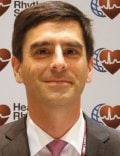SAN FRANCISCO, CA ( updated ) — Randomized data suggest catheter ablation is better than doubling down on antiarrhythmic drugs to quell recurrent ventricular tachycardia (VT) in patients with ischemic cardiomyopathy and an implantable cardioverter-defibrillator (ICD)[1].
Over 27.9 months of follow-up in the VANISH trial, ablation reduced by 28% the primary composite outcome of death at any time, VT storm, or appropriate ICD shocks after 30 days, compared with escalated therapy involving higher-dose amiodarone or amiodarone plus mexiletine (59.1% vs 68.5%; hazard ratio [HR] 0.72; P=0.037).
Neither treatment showed superiority with respect to mortality, although the trial was not powered to assess this outcome and the finding should be interpreted with caution, lead investigator Dr John L Sapp (Dalhousie University, Halifax, NS) said during a late-breaking clinical-trial session at the Heart Rhythm Society (HRS) 2016 Scientific Sessions. The results were simultaneously published in the New England Journal of Medicine.

Dr John L Sapp
"The clinical interpretation is that when patients experience ventricular arrhythmias despite antiarrhythmic drug therapy, catheter ablation should be considered and in some cases preferred, particularly among patients who have recurrent arrhythmias despite amiodarone," Sapp told heartwire . "Our next clinical question is, what should first-line therapy be?"
Patients who underwent ablation, however, stayed on their baseline dose of amiodarone to address new arrhythmias that may emerge, so ablation will not eliminate the need for amiodarone entirely, he added. "I hope that it will reduce the need for long-term and/or high-dose amiodarone for some patients."
Dr Andre D'Avila (Hospital Cardiologico, Florianopolis SC, Brazil), who was not involved in the trial, told heartwire that VANISH shows that VT ablation is safe and that "we should not disregard this procedure because of no clear mortality benefit, because it seems to be very effective or at least more effective than antiarrhythmic drugs to use ablation to prevent shocks, which is a big problem for patients."
That said, he observed that ablation is still related to a very high recurrence rate. "So we have to do something different in selecting patients for ablation or implementing or using a different energy source, because of all the recent changes in terms of new mapping systems, new catheters, new ways to deliver radiofrequency ablation, our results have been the same for decades."
In the 127 escalated-therapy and 132 ablation patients, appropriate ICD shocks occurred in 266 and 169 patients, respectively (P=0.28), and inappropriate shocks in 85 and 66, respectively (P=0.46).
Deeper DiveIn subgroup analyses, the rate of the primary outcome was significantly lower with ablation only among patients whose index arrhythmia occurred despite amiodarone at baseline (P=0.03 for interaction). Two-thirds of all patients were on amiodarone at baseline.
To heartwire , Sapp said, "I do think this is clinically significant, and that's bolstered by the fact not only are you achieving better arrhythmia outcomes after ablation, but you also have fewer treatment-attributable adverse events [22 vs 51; P=0.002]."
Notably, there were two cardiac perforations, three cases of major bleeding, and three vascular injuries with ablation and two deaths from pulmonary toxicity and one from hepatic dysfunction with escalated therapy.
Dr Andrew Krahn (Heart & Stroke Foundation of British Columbia, Vancouver) who comoderated a press briefing on the study, said patients are often very accepting of just changing medications and riding it out but that the real question is what to do when they've had another shock or get into an unstable situation. "This trial really informs the question of whether it's okay to be aggressive. It's okay to get in there and try to get ahead of this and prevent the next one, and it comes with some costs."
He went on to add, however, "It's compelling that we have much work to do to try to improve the outcome of these patients regardless of which strategy we choose, because the event rates are still high."
Sapp described the patients as "a very high-risk population," noting that about 50% experienced recurrence and 25% died over 3 years.
Press briefing comoderator Dr Thomas Deering (Piedmont Heart Hospital, Atlanta, GA), agreed, saying that while defibrillators have certainly improved survival, we've created a "new entity" in terms of people with repetitive shocks and VT storm. "Studies like this demonstrate that taking a more aggressive approach with a lower event rate is an appropriate possibility in patients, cognizant of the fact that the data are close. Because the natural tendency in these sick patients is to do nothing, and that has its consequences as well, as do the antiarrhythmic drugs."
Dr Dhiraj Gupta (Liverpool Heart and Chest Hospital, UK), who was not involved in the study, told heartwire that the electrophysiology community would have hoped the results were more positive in terms of efficacy but that "the safety aspect was what really sold it to me. We all suspect that antiarrhythmic drugs have toxicity attached to them, but to have it pointed out so starkly as in this trial was very prominent. There were four deaths in the drug arm and none in the ablation arm—mind you, it's a sick population to be ablating in—but to have not a single death tells you how safe VT ablation has become."
The study was funded by the Canadian Institutes of Health Research, with unrestricted grants from St Jude Medical and Biosense Webster. Sapp reported grant support and personal fees from Biosense Webster and personal fees from St Jude Medical and Medtronic outside the study. He also reported a patent related to a method for ablating with needle electrode and two pending patents related to computer-aided localization of site origin of cardiac activation. Disclosures for the coauthors are listed on the journal website.
Follow Patrice Wendling on Twitter: @pwendl. For more from theheart.org, follow us on Twitter and Facebook.
Heartwire from Medscape © 2016
Medscape, LLC
Cite this: VANISH: Ablation for Recurrent VT Bests Intensified Amiodarone - Medscape - May 05, 2016.










Comments